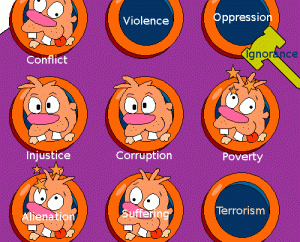As many of my colleagues and online acquaintances may know, my professional work has largely been grounded in the application of systems theory, to analyze and solve problems calling for a systems approach.
Now that I’m mostly retired, I’ve increasingly begun to reflect on the larger class of problems that plague humankind, above and beyond the more tractable class of problems that a person of my educational background in the STEM disciplines might have been recruited to work on at research venues like Bell Labs, BBN, Stanford, or MIT.
About eight years ago, I began to chronicle my thoughts about the ten biggest and most intractable problems, observing that, from a systems theoretic point of view, all ten of them had a common underlying structure.
As I assay it, the ten most intractable plagues of western civilization are conflict, violence, oppression, injustice, corruption, poverty, ignorance, alienation, suffering, and terrorism.
All ten of these hellish problems have something in common. Like cancer, they tend to reseed themselves, round-robin, from one instance to the next, in a never-ending cycle of recursion.
Systemic problems call for a systems approach to problem-solving. But that’s not going to happen until we elevate our collective problem-solving skills to near-genius levels.
I would like to see President Obama convene a national problem-solving congress, staffed with the best and the brightest systems thinkers our society has to offer, to systematically address, analyze, and solve the interlinked systemic problems of conflict, violence, oppression, injustice, corruption, poverty, ignorance, alienation, suffering, and terrorism.
How can those of us who share and promote the systems approach elevate this idea and organize an effective community of forward-looking problem solvers?

Dale Langdon
I see all of those as examples of Othering. If there is a root at the bottom, I think that’s it.